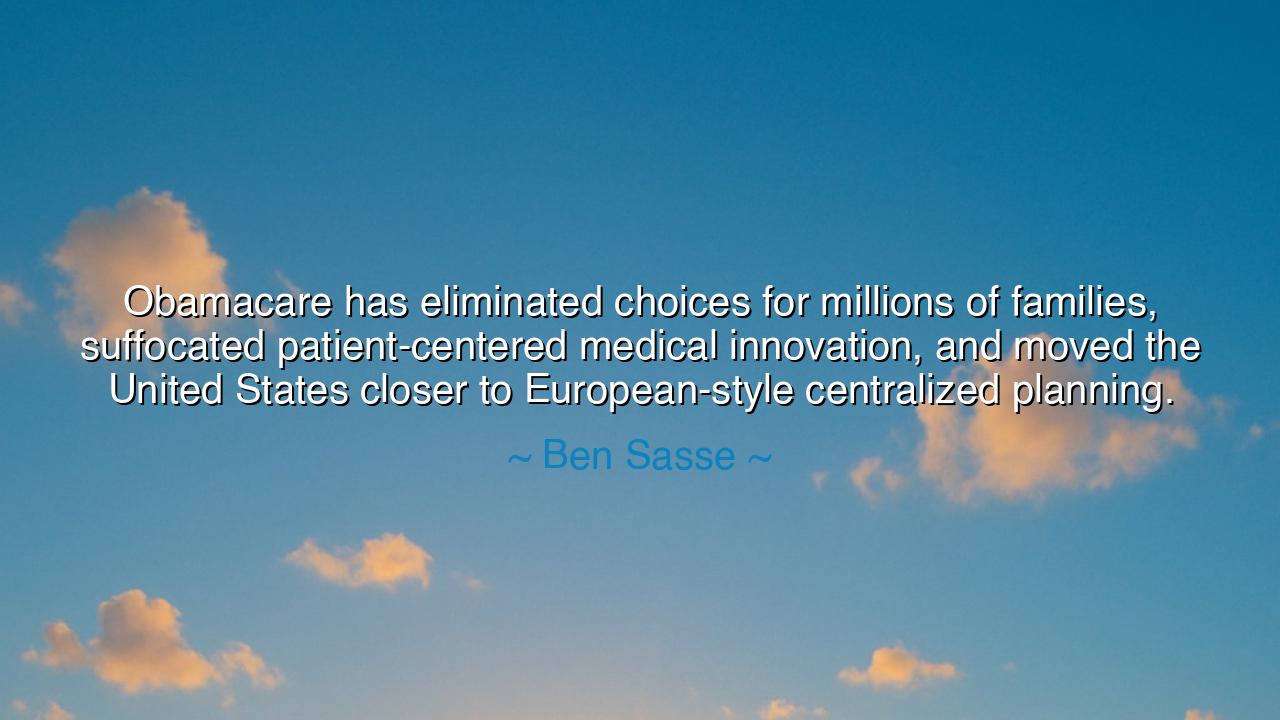
Obamacare has eliminated choices for millions of families
Obamacare has eliminated choices for millions of families, suffocated patient-centered medical innovation, and moved the United States closer to European-style centralized planning.






“Obamacare has eliminated choices for millions of families, suffocated patient-centered medical innovation, and moved the United States closer to European-style centralized planning.”
Thus spoke Ben Sasse, a statesman and scholar of the American spirit, whose words carry both warning and lament. His voice rises not from hatred of reform, but from reverence for freedom—that sacred flame upon which the nation was built. In this quote, Sasse does not merely critique a policy; he calls attention to a deeper conflict, one as old as civilization itself: the struggle between the power of the state and the liberty of the individual. He warns that when governments grow vast and centralized, even the noble desire to heal can become a chain around the neck of human innovation and choice.
To understand the meaning of Sasse’s words, one must look to the heart of the debate surrounding the Affordable Care Act, known as Obamacare. Conceived as a law to extend health coverage to the uninsured, it sought to make medicine more accessible. Yet, as Sasse and others observed, its complex web of mandates, regulations, and subsidies altered not only access but the very soul of American healthcare. He saw in it a shift from patient-centered care—where doctor and patient decide together—to government-directed care, where bureaucrats and policymakers dictate the limits of treatment. The heart of his concern lies here: when choice is sacrificed for uniformity, freedom itself begins to suffocate.
In the ancient world, philosophers like Plato envisioned societies ruled by philosopher-kings, where wisdom guided every decision from above. But later thinkers—Aristotle, Cicero, and in modern times, the Founding Fathers—warned that power, no matter how enlightened, becomes dangerous when concentrated. They believed the strength of a nation lies in its citizens’ ability to decide for themselves—to choose their paths, to take responsibility for their health, their labor, their destiny. Sasse’s warning echoes this lineage: that the machinery of centralized planning, no matter how well-intentioned, can dull the spirit of individual courage and creativity.
There is an ancient parable that speaks to this truth. A wise ruler, seeking to protect his people from famine, built vast storehouses and controlled the planting of every field. At first, his people rejoiced, for none went hungry. But over time, the farmers ceased to sow with passion, for their crops no longer belonged to them. The storehouses grew, yet the spirit of the land withered. When the ruler died, the people found themselves unable to farm without command. What began as mercy ended as bondage. So it is, Sasse warns, when government overreach—however compassionate—replaces initiative with dependency, and innovation with compliance.
His mention of “European-style centralized planning” is not a condemnation of Europe, but a caution against a path that values equality of outcome above the vitality of competition. For in Europe’s more socialized systems, the government often decides what treatments are available, what drugs may be funded, and how physicians must practice. Sasse fears that if America walks this same path, the fierce individualism that fueled its medical breakthroughs—the curiosity of the inventor, the daring of the surgeon, the boldness of the entrepreneur—will be replaced by the slow rhythm of bureaucracy. He reminds us that progress, like freedom, thrives best where the human spirit is allowed to take risks.
Yet beneath his critique lies not despair, but challenge. For Sasse’s words summon his listeners to reflection and responsibility. He does not call for neglect of the poor or indifference to the sick. Instead, he calls for a renewal of balance—a system that combines compassion with liberty, aid with autonomy, care with creativity. He invites the nation to remember that true health care is not only about medicine—it is about the freedom to choose one’s care, to invent new cures, to dream of better ways to heal.
Let this, then, be the lesson for generations to come: when compassion forgets freedom, it becomes control; when freedom forgets compassion, it becomes cruelty. The wise society must guard both as twin pillars of its strength. To the rulers, Sasse’s warning whispers: govern with restraint, lest you smother the flame of innovation. To the people, it calls: remain vigilant, for your choices are the lifeblood of liberty.
And so, O children of the Republic, remember this truth—freedom and care must walk together. Build systems that uplift the weak without weakening the strong. Protect the innovator as fiercely as the patient, for both serve the same cause: the flourishing of life. As Ben Sasse reminds us, the truest medicine for a nation is not only the healing of bodies, but the preservation of the spirit that dares to be free.






AAdministratorAdministrator
Welcome, honored guests. Please leave a comment, we will respond soon